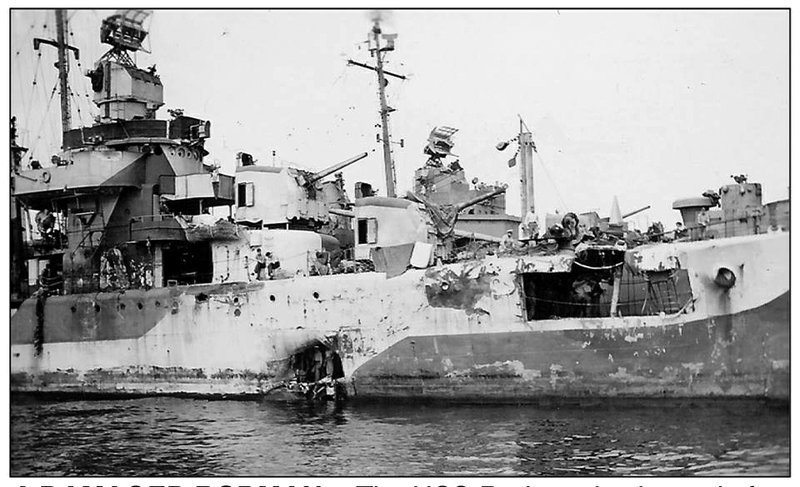Last week my wife Lonnie and I were away, back in northwestern Kansas, due to the death of Lonnie's father, a 94-year-old WWII Navy veteran. Since we were away and busy with funeral arrangements, I include for this week's column an April 6, 2005, article telling a part of his story 60 years later which I wrote for the Phillips County Review, a Kansas newspaper I edited at the time.
"I'm no hero," Leonard Pfortmiller said when asked about his part in a battle that raged on this date sixty years ago just off the coast of Okinawa. On April 6, 1945, Pfortmiller was aboard the USS Rodman, a U.S. Navy destroyer which had been converted to a minesweeper.
The ship was on picket duty early that day and was later shifted to screening duty, providing anti-submarine and anti-aircraft screen for a number of smaller minesweeping vessels that were clearing an area near the northwest corner of Okinawa.
Leonard Pfortmiller, age 81, of Stuttgart, was below deck in the bow area of the ship on that day, taking inventory of equipment; but shortly before 3:30 in the afternoon, he left the bow and went to do his laundry before going on watch.
Just minutes after leaving the bow of the ship, a Japanese suicide bomber crashed his plane into the forecastle of the ship. Two bombs exploded, ripping open the forecastle of the Rodman from the deck down to the waterline, killing 16 sailors and wounding 20 more.
At almost the same time, another suicide bomber crashed his plane into the water on the starboard side of the ship where his bombs exploded, tearing open the Rodman above and below the waterline and flooding most of the forward part of the destroyer. Fires raged and the ship was dead in the water.
Pfortmiller was a gun captain and manned the 40-millimeter anti-aircraft guns on the starboard side of the ship. Without power, he and a second gunners mate named Hill had to load and operated the guns by hand.
"Hill and I had to load the 40s by hand, go up, train and shoot," Pfortmiller said. "The Japanese planes kept coming in groups of seven, five or three."
The battle continued to rage for three and a half hours, with somewhere between 30 and 50 suicide planes involved in the attack.
According to the Sept. 4, 1945, issue of The News and Courier, Charleston, S.C., numerous enemy planes were shot down, some as close as 50 yards from the ship and others passing over the ship and crashing into the water on the other side.
One plane came over so low, according to The News and Courier, it clipped off the trainer's sight on the starboard 40-millimeter mount, the same location where Pfortmiller and Hill fought to save their ship.
All Pfortmiller said of that plane was, "I ducked."
The USS Emmons, a sister ship to the Rodman attempted to come alongside and assist the crippled ship; but the Emmons too took numerous hits herself. Her magazines exploded and fires got out of control. She had to be abandoned and was scuttled the next day.
According to Pfortmiller, the Rodman crew members flooded their number one magazine to keep it from exploding. Many considered it an act of divine providence that the ship's magazine did not explode.
The Rodman crew was credited with knocking down at least six Japanese planes that day.
The News and Courier said the ship splashed 13. The ship suffered direct hits by at least three kamikazes, with one of the suicide bombers striking the Rodman just below the bridge. The plane became lodged in the captain's stateroom.
The Rodman was towed to Kerama Retto where she underwent temporary repairs in a floating dry dock. From there, she went under her own power to Guam and then through the Panama Canal to Charleston, S.C. for repairs. The war ended before her repairs were complete.
Pfortmiller doesn't talk much about that April day. The memories are anything but pleasant.
"I'm not a hero," he says. But some may beg to differ.
Note: There are more stories which could be told of Pfortmiller's service prior to this April day in 1945, including sinking a German U-Boat in the Mediterranean and rescuing the German captain and surviving crew members, landing supplies on the coast of France on D-day, and more.
Editorial on 02/13/2019

